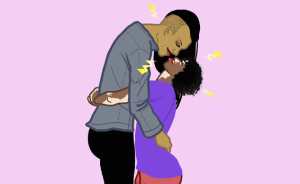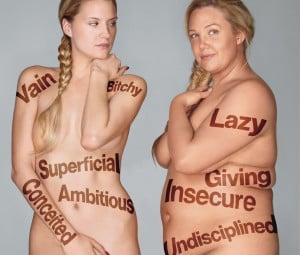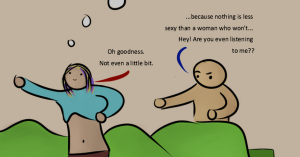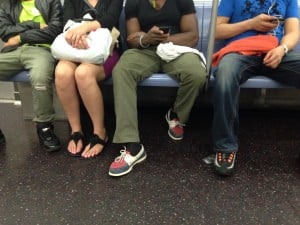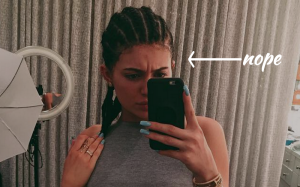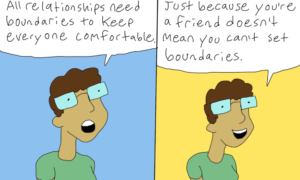Sometimes I stand in front of the mirror and wonder: Is this what a feminist looks like? Screw the hashtags, homophobic lesbian baiting, and Emma Watson. Am I what a feminist looks like?
I’ve been a member of the Third Woman Press: Queer and Feminist of Color Publishing collective for a few years. A part of the work that we do, as one of the few presses dedicated exclusively to feminist folks of color, is represent both the project and the politics.
This means that I’m often at events, on panels, and in classes being a “professional feminist.”
First of all, this is weird.
My partner frequently says I get paid to do things no one thinks you can get paid to do. And I admit that my resume basically qualifies me to call people out on racism and sexism on the daily.
However, regardless of my paper trail or community work, I’ve learned that there’s a certain expectation when I walk into a room where I’m about to talk about feminism. And it’s an expectation I never meet.
I don’t waver on my commitment to social justice work. I take it seriously in professional, personal, and community spaces. Yet I always feel like I fall short of the feminist ideal.
Why?
Because feminism has developed internal stereotypes. And I don’t fit.
Generally, American society thinks all feminists look like Gloria Steinem did in the ‘60s or like Lena Dunham does now. Feminists are generally assumed to be cisgender, straight, white women who aren’t shy when it comes to a protest march and make a career out of calling themselves feminists.
Over time, women of color were integrated into the fold so our stereotypes still have some of the same characteristics, like being cisgender and feminine – not to mention being activists and super vocal. Think Angela Davis here.
I’ve thought long and hard about why these stereotypes are harmful. And other than simply creating cliques (because we all loved those in school), there are greater implications.
I think we need to ask ourselves what we want feminism to be.
Do we, as feminists, want a world in which all our multiracial, gendervariant glory is denied or unacknowledged? Isn’t this discouraging at best – and exclusionary at worst?
I want a better movement. I want one that includes trans men, trans masculine, or gender non-conforming folks. I want a feminism that includes my students, my high school teachers, and my mom.
I want a feminism that includes me.
And I want a feminism that includes you.
So the following is a love letter. It’s an ode to the uncool kids.
The feminists who don’t have an undercut or an asymmetrical sweater, the folks who wear Ann Taylor, but come just as hard as everyone else.
This one’s for you.
1. It’s Okay – You Can Put the Red Lipstick Down
The other day, a good friend told me she doesn’t think people perceive her as a Chicana feminist.
Now, she’s one of the fiercest Chicana feminists I’ve ever met, so this was kind of shocking for me to hear. But there she was on Instagram, thumbing through pictures, when she realized that many of the womxn she admired were femmes who wore red lipstick.
So she took herself right to Target.
For a tube of red lipstick.
Wait. Collaborate and listen.
During a recent TWP collective meeting, we talked about this new look or aesthetic of super feminine glittery/neon women of color feminists. We talked about how it’s a relatively recent thing, and while it’s dope that we’re seeing women of color represented, it’s also another category from which many of us are explicitly omitted – which is hard because mainstream feminism already left Black, brown, Indigenous, and Asian women out.
All feminists don’t present the same way, which is too bad. I mean, how else are we supposed to be able to enter into a room and spot the nearest ‘down’ feminist and know we’d be relatively safe having a conversation with them?
But in all seriousness… It would be straight up nice if this could be boiled down to lipstick color and outfit.
But the reality of it is there isn’t one look – and the expectation of one creates an internal pressure to perform feminism in a way that’s neither accurate nor fair.
More importantly, this pressure is connected to systemic oppression.
Black Feminist Patricia Hill Collins describes the act of controlling images as being “designed to make racism, sexism, poverty, and other forms of social injustice appear to be natural, normal, and inevitable parts of everyday life.”
In other words, controlling images reinforces forms of oppression that connect with each other.
And unfortunately, feminism is a great example of how controlling images works to exclude folks and make it seem okay.
2. Not All Feminists Are Women
When I started writing this article, I was kind of shocked that we’re still dealing with the same invisibility around trans folks we saw decades ago.
Darkmatter recently shared a Facebook post saying, “GNC (gender non-conforming) and non-binary people of color are so often forgotten by feminist, queer, trans, and anti-racist movements… Even though people of color are more likely to identify as non-binary, the only people who are recognized as such tend to be white, masculine, and/or thin people. Due to patriarchy and transmisogyny, non-binary femmes are continually erased.”
And let me say, preach (!) because a part of our struggle as feminists of color is to create space for and be in solidarity with people who are hurt by the politics of our own movement.
That means making it an explicit point to bring folks who are gender non-conforming, genderqueer, or trans to forefront because they do the good work, but get little and often no love because of internalized misogyny and transphobia.
So to all the genderqueer, gender non-conforming, trans, and transmasculine feminists: Holler! We see you.
3. It’s Okay If You Don’t Have Letters After Your Name
The Crunk Feminist Collective calls Mama Feminism the “way of life… that made woman power and intentional equality a survival strategy and mechanism to make up for oppression, the absence of men, and lifestyles that were without the luxury of adhering to strict gender scripts.”
Mama feminism is often the most powerful and organic form of feminism we have as low-income people of color (holler at all the single moms out there).
But because there’s a lingo and history that folks may or may not know, the literate and formally educated feminists frequently take it upon themselves to “teach” (read: talk down to) other feminists.
And as someone who is studying women of color feminism in a graduate program, I admit I’m guilty of this one, too – and I need to be better at it.
I have a friend who is a community warrior. She’s a self-identified Black Feminist. But once, when she was at a meet-up with someone in a graduate program doing feminist studies, she got a long-ass lecture about the official definition of intersectionality.
The thing is, my friend has a pretty damn on-point understanding of the concept without ever having read the “scholarly” texts, so someone feminist-splaining to her was totally and completely unnecessary.
I have seen (and probably been one of the) academic feminists who are super punitive in the way they engage with community members who don’t have the language or the concepts, but are in every way doing the damn thing.
So to the scholars, take fifteen seats. And on behalf of feminist scholars everywhere, I’d like to apologize to the community warriors for the classism. We all learned how to be feminists from folks like you.
4. It’s Alright to Be Allergic to a Protest
So I’ll be real, I was Facebook creeping on Everyday Feminism editor Melissa A. Fabello the other day, and the level of hate mail she gets is out of control. I mean, people threaten her life and livelihood.
Now, if people want to tell me online activism isn’t dangerous or public or confrontational, I suggest you think GamerGate. Think GamerGate and the badassery it takes to be Melissa A. Fabello.
Go ahead. I’ll wait.
I’m not here to say feminists need to be online activists. And as someone who likes kicking it firmly at the end of a march and is allergic to the bullhorn, I’m certainly not here to say feminists always need to be protesting in the streets.
I’m here to agree with queer indigenous activist Kelly Hayes who tweeted, “There is no singular tactic or event that anyone must participate in to prove the veracity of their politics.”
#MicDrop
I agree with her for the same reason I believe Mama Feminism is a real thing: Feminism is an entire movement of people doing different things simultaneously to eradicate racism, sexism, classism, colonialism, ableism, homophobia, and more.
And because these systems of oppression weave themselves into our lives in both clear and hidden ways, this means that we, as feminists, can and must confront them however we need to – be it through protests, parenting, or Facebook posts.
So the sole person of color on a college campus fighting to make it safe for the one out of every five women who will be raped in her time there? Feminist.
The mom who changes office policy to protect the right to breastfeed? Maybe a feminist. The high school teacher in Ohio who refuses to assign white male authors? Also a potential feminist.
None of these people might be cool, or loud, but damn, are they doing work! So STFU.
5. Sidenote: It’s Totes Okay Not to Be a Feminist, Too
Now, I have some super close friends who don’t identify with feminism because it’s generally been a White Ladies Only club. As Jaimee A. Swift put it over at For Harriet:
“While I want equality for all women, all men, and all people of all races, as a Black woman I cannot align myself with a women-centered movement that refuses to be inclusive of racial inequities and gender disparities. I am weary and will no longer advocate for inclusion in a white-female oriented space where I, and countless other Black women, have been constantly rejected.”
I’m good with that because if calling myself a feminist means I am forever explaining why race matters to a room full of white women, I’d like to be excused please.
There are incredible people who aren’t “feminists” doing feminist work. Folks like Caaav: Organizing Asian Communities and #BlackLivesMatter are doing anti-racist feminist work. They’re just not calling it that for really good reasons.
And recognition and understanding of that boundary is key.
So to the anti-racist warriors out here: Much love – and we’ll try to make sure feminism takes your lead with an all-hands-on-deck commitment to racial justice.
***
I love you. No, really.
We don’t all need to be the same kind of feminist. Because let’s be real, we’re not all the same kind of feminist. The beautiful thing about feminism right now is the number of ways you can do it.
We can look at our forbearers for some helpful examples here from Angela Davis to Chimamanda Ngozi Adichie. Both feminists, both dedicated, but one is a former Black Panther, while the other is a novelist quoted in a Beyoncé song. Different, but definitely both feminists.
Another two examples are Ai Jen Poo and Margaret Cho. One is a labor activist, and the other is a former sex worker comedian actress. Both fierce. Both feminists.
So to the womxn of color who do feminism in their own way, on their own terms, and get no love for what can only be called tired reasons, this one’s for you.
Because feminists wear mom jeans. Feminists wear pant suits. Feminists are anti-racist activists. Feminists carry diaper bags. Feminists work behind computers. Feminists get waxed.
And feminists don’t look like “feminists.”
#ThisIsWhatAFeministLooksLike
[do_widget id=’text-101′]
Kim Tran is a Contributing Writer for Everyday Feminism. She’s also a collective member of Third Woman Press: Queer and Feminist of Color publishing. Her academic and activist commitments are to laborers, refugee and queer communities. She facilitates workshops on uprooting anti-black racism in Asian American communities. She is finishing her Ph.D in Ethnic Studies at UC Berkeley where writes on race, gender and economics. Her work has been featured on Black Girl Dangerous, Nation of Change and the Feminist Wire. She can be found in any of these capacities at www.kimthientran.com.
Search our 3000+ articles!
Read our articles about:
Our online racial justice training
Used by hundreds of universities, non-profits, and businesses.
Click to learn more









